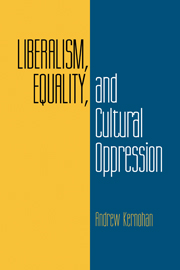4 - Neutrality and the Harm Principle
Published online by Cambridge University Press: 11 January 2010
Summary
I shall now begin to argue that an egalitarian liberal state should be governed by a severely modified conception of state neutrality in its approach to an oppressive culture. An oppressive culture embeds its members in inegalitarian social meanings which support beliefs about unequal entitlements that egalitarian liberals must regard as false. The profession, practice, and promulgation of these beliefs harm important interests. Cultural oppression, construed narrowly as the social transmission of false beliefs about inequality, can undermine self-respect and harm highest-order interests in knowing the good. Most generally, these harms are accumulative harms. Accumulative harms, however, present difficulties to liberal theory. Liberalism does permit political interference with individual conduct to prevent harm to others, but it usually employs an individualistic interpretation of harm which fails to properly recognize accumulative harms.
Mill's harm principle states that “the only purpose for which power can be rightfully exercised over any member of a civilized community, against his will, is to prevent harm to others.” The harm principle also applies to the neutrality of the liberal state. Larmore writes:
The state should not seek to promote any particular conception of the good life because of its presumed intrinsic superiority – that is, because it is supposedly a truer conception. (A liberal state may naturally restrict certain ideals for extrinsic reasons because, for example, they threaten the lives of others.) [emphasis in original]
The parenthetical sentence claims that though state intervention cannot be justified on the ground that a way of life is inferior, it is justified on the ground that the way of life is harmful to others.
- Type
- Chapter
- Information
- Liberalism, Equality, and Cultural Oppression , pp. 71 - 87Publisher: Cambridge University PressPrint publication year: 1998



